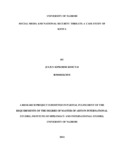| dc.description.abstract | Social Media are connection and mass communication tools, characterized by a global diffusion
and an ever-growing level of use, considering their handiness and flexibility, as well as their
extreme cheapness. Social media platforms has far reaching social and security implications for
the people of Kenya, their government and its national security agencies such as the military and
the police. In order to protect Kenya’s freedom, security and prosperity, it is only fair that some
serious studies be done about how the Government can harness online social networking tools
and in equal measure monitor them in the event it threatens national security. The purpose of this
study is to analyze social media and national security threats in Kenya. Specific objectives were
to examine: the threats of social media technology to Kenya’s national security; the use of social
media by the military in preventing, limiting or removing threats to national security; and the
current state of Kenya’s national security and how social media makes it worse. The study
adopted survey research method. The target population was all members of the military working
in Nairobi units and a sample size of 50 members of the military working in Nairobi units. The
study used proportional stratified sampling method. From the findings, it was found that social
media are used by terrorist organizations as tools for ideological radicalization, recruitment,
communication and training of its members. It found that terrorist groups take advantage of
Social Media to communicate with cyber-crime groups and to coordinate along with them fundraising activities carried out in part or completely on the Internet. The study found that social media are also used by Islamist groups for propaganda activities aimed at making public
successful terrorist attacks, and, consequently, at throwing civil population into a panic. Criminal
organizations are threats on drug smuggling, human trafficking and money-laundering. It found
that community criminal organizations like Mombasa Republican Council (MRC), ‘Mungiki’
and ‘Sungusungu’ use social media as a tool to recruit, communicate, Spread propaganda and
radicalization to a great extent. On the other hand the military use social media for military
operations, communicating process of operation, boost morale of soldiers, clarify on propaganda
messages sent by enemies and dispelling rumors, for updating civilians on progress of military
operation, for public relations and operations such as “operation Linda Kenya”. It found that the
military uses social media as Open-Source Intelligence (OSINT) to analyze social media threats
as was the case in Westgate attack, Nairobi. The study found that the Kenyan Military uses social
media as tool for Diplomacy in gathering and Disseminating Information. Through blogs,
Facebook, emails and Twitter, Kenyans can source and comment on topical political, economic
as well as social issues. The study found that the security in Kenya is average and Kenya is still
grappling in the dark as the monster of hatred spreads. It found that social media has contributed
towards cattle rustling, poaching, terrorism attacks, tribal clashes, information warfare and hate
speech. The study concluded that terrorist groups take advantage of Social Media to
communicate with cyber-crime groups and to coordinate along with them fund-raising activities
carried out in part or completely on the Internet. It concludes that social media are also used by
Islamist groups for propaganda activities aimed at making public successful terrorist attacks, and,
consequently, throwing civil population into a panic. It concludes that counter propaganda is
used by the military to counter social media threats. And that the best news management comes
from the military since they have a range of options for communicating their standpoint. The
study recommends that Kenya needs to develop a comprehensive and adaptive national
government policy framework that identifies roles, responsibilities, and resources across the
government in order to detect, defend and pre-empt social media threats to the nation | en_US |

